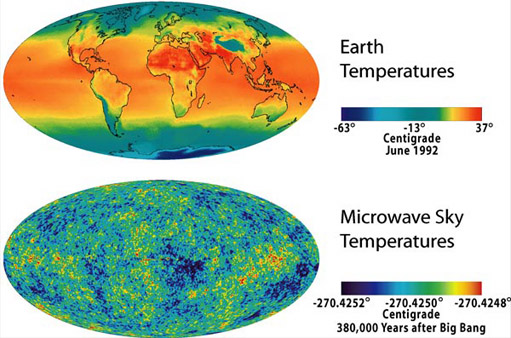Physics for the Brain-Dead
Posted: 29.09.2008, 21:33
If the Good Doctor Schrempp (or one of you other, knowledgeable geniuses here) could help me out in understanding the
following question, I would be very grateful. As you all know, I am NOT the sharpest tool in the shed. I do continue to
have an abundant curiosity and a great interest in the topics of physics though, so please forgive the apparent stupidity
of the question:
To wit,
When we look into any area of the Universe, we see that the temperatures in any given area are consistent. In other
words, they are pretty much the same temperature at any point in space, as long as you are not close to a star or
some other object. After watching an episode of the "Universe" on the history channel. I learned that this is explained
away using some highly technical terminology which states that gravity separated shortly before any other of the
elemental forces, and that the remaining forces stayed together during the first fraction of the Big Bang explosion
long enough so that temperatures were uniformly distributed during the Big Bang itself.
My question though involves the explanation I heard which stated that 13.7 billion years was not enough time for
the temperature to be uniformly distributed in the Universe we see. Can I ask please, "How is this possible?"
Would seem to me that 13.7 billion years should be long enough for any distribution of temperatures.
Sorry for the question, but I really am just curious here. If this really is a stupid question, please just tell me why.
Thanks, Brain-Dead
following question, I would be very grateful. As you all know, I am NOT the sharpest tool in the shed. I do continue to
have an abundant curiosity and a great interest in the topics of physics though, so please forgive the apparent stupidity
of the question:
To wit,
When we look into any area of the Universe, we see that the temperatures in any given area are consistent. In other
words, they are pretty much the same temperature at any point in space, as long as you are not close to a star or
some other object. After watching an episode of the "Universe" on the history channel. I learned that this is explained
away using some highly technical terminology which states that gravity separated shortly before any other of the
elemental forces, and that the remaining forces stayed together during the first fraction of the Big Bang explosion
long enough so that temperatures were uniformly distributed during the Big Bang itself.
My question though involves the explanation I heard which stated that 13.7 billion years was not enough time for
the temperature to be uniformly distributed in the Universe we see. Can I ask please, "How is this possible?"
Would seem to me that 13.7 billion years should be long enough for any distribution of temperatures.
Sorry for the question, but I really am just curious here. If this really is a stupid question, please just tell me why.
Thanks, Brain-Dead
